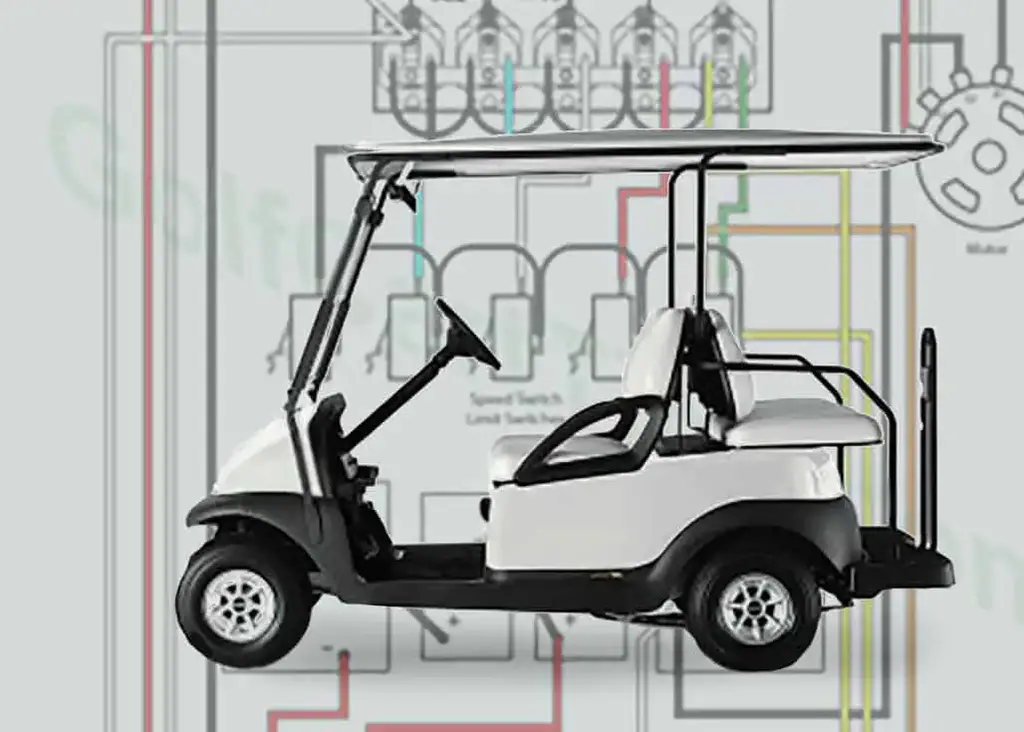
Club Car Golf carts have evolved many times since 1975, and although the basic electrical design has stayed close to the same, there are small differences. These differences are important when troubleshooting your cart.
Club Car DS Electric Models
Club Car DS 1981-85 Electric 5 Solenoid Type Wiring Diagram
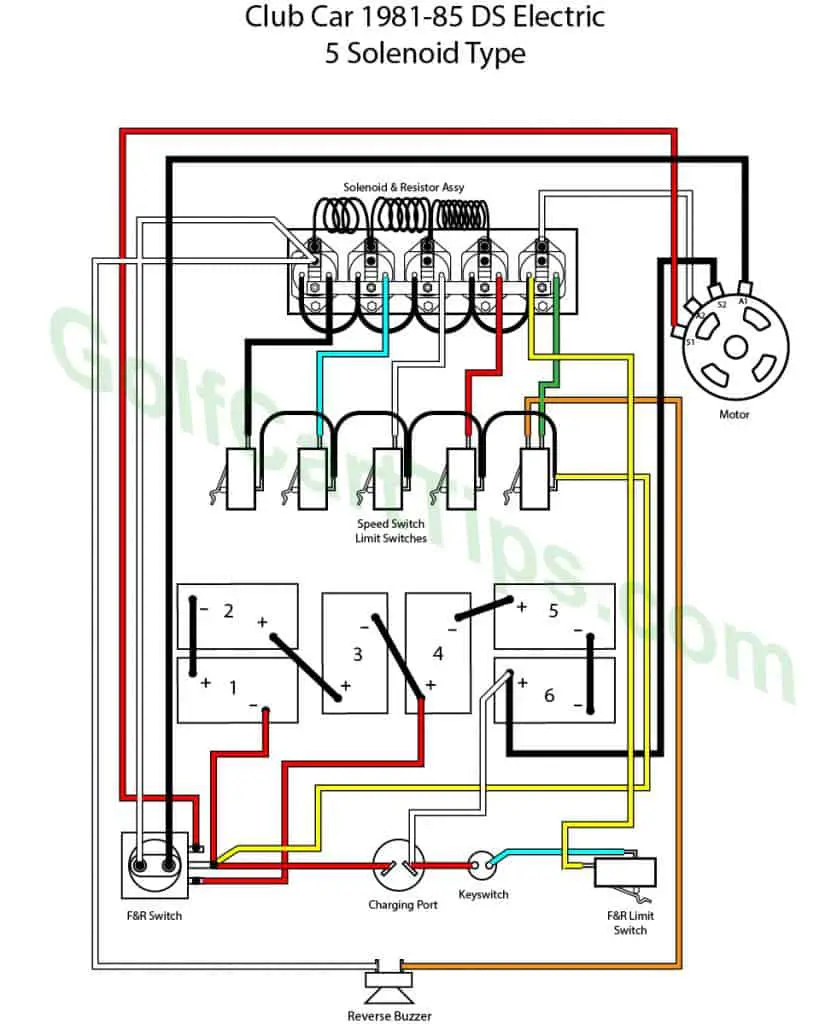
Club Car DS 1986-94 Electric 5 Solenoid Type Wiring Diagram
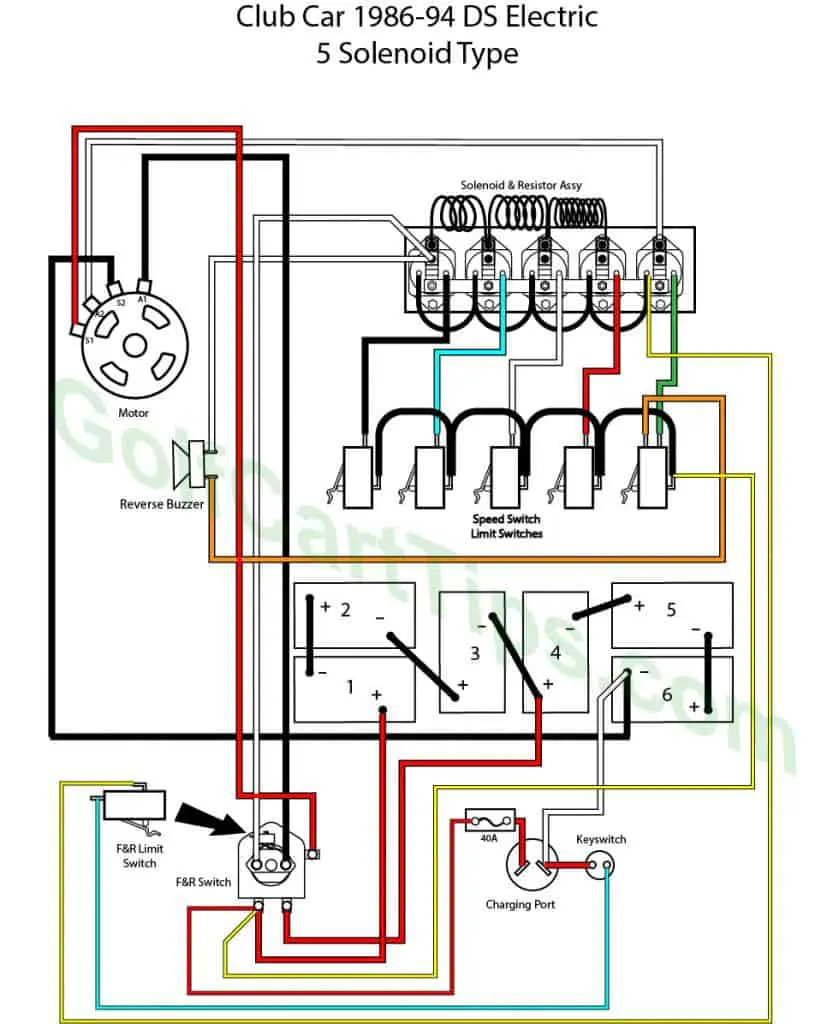
Club Car DS 1995-2002 Electric 36 Volt V-Glide External Resistor Type Wiring Diagram
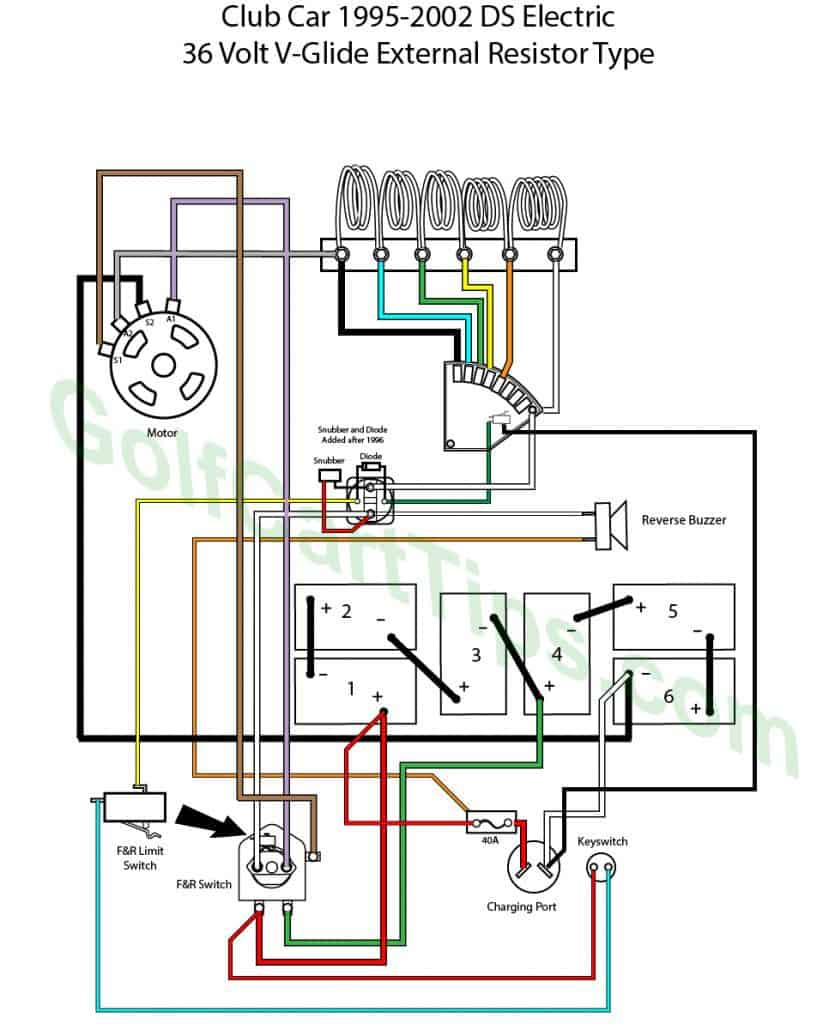
Troubleshooting Guide For Club Car DS Electric Models
| SYMPTOM | PROBLEM AREAS | POSSIBLE CAUSES |
|---|---|---|
| Vehicle will not run - no "solenoid click" | Batteries | 1. Battery connections 2. Discharged batteries |
| Key Switch | 1, Loose wires 2. Failed switch | |
| Forward/Reverse Anti-Arcing Micro Switch | 1. Loose Wires 2. Failed Switch 3. Cam not Activating Micro Switch | |
| Accelerator Linkage | 1. Accelerator rod disconnected or loose | |
| Speed Controller Micro Switch | 1. Loose wire 2. Disconnected or loose wires 3. Failed switch | |
| Solenoid | 1. Loose Wires 2. Failed solenoid coil | |
| Vehicle will not run - "solenoid clicks" | Forward/Reverse Switch | 1. Loose wires 2. Failed contacts |
| Motor | 1. Loose wires 2. Open windings 3. Worn out brushes | |
| Solenoid | 1. Failed contacts | |
| Cart Skips One Or More Speeds | Speed Controller | 1. Loose or broken connections 2. Brush or contacts corroded, burned, or worn 3. Incorrect wiring |
| Resistors | 1. Loose or broken resistor | |
| Cart Runs Slow | Speed Controller | 1. Loose or broken connections 2. Contacts corroded, burned, or worn |
| Batteries | 1. Loose or corroded terminals 2. Incorrect wiring 3. Battery failure 4. Batteries not fully charged | |
| Accelerator Linkage | 1. Improper adjustment on accelerator rod | |
| Motor | Loose cables 2. Brushes worn or misaligned 3, Dirty commutator | |
| Brakes | 1. Brakes dragging | |
| Tires | 1. Flat or underinflated tires | |
| Cart runs in first speed when F&R switch is in forward or reverse with key switched off | Solenoid | 1. Solenoid contacts welded in closed position |
| Accelerator Linkage | 1. Misadjusted or bent accelerator rod | |
| Speed Controller | 1. Pedal misadjusted 2. Stuck accelerator brush | |
| Cart goes forward but not in reverse - or cart goes in revers and not forward | Forward/Reverse Anti-Arcing Micro Switch | 1. Loose or broken wires 2. Switch not actuating properly |
| Forward/Reverse Switch | 1. suspect continuity of switch contacts | |
| Cart not charging completely | Charger Connections | 1. Loose wires at F/R Switch, receptacle, or battery |
| 1. Charger plug not fully engaged with receptacle | ||
| On Board Fuse | 1. Blown fuse | |
| Charger | 1. Charger not receiving 115/120 volts, 15 amps 2. Charger faulty, not producing full output 3. Faulty cords or plugs |
Club Car DS Gas Models
Club Car DS 1984-1985 Gas Model Wiring Diagram

There was a small change in the Limit Switch Wiring for later models of the same year.
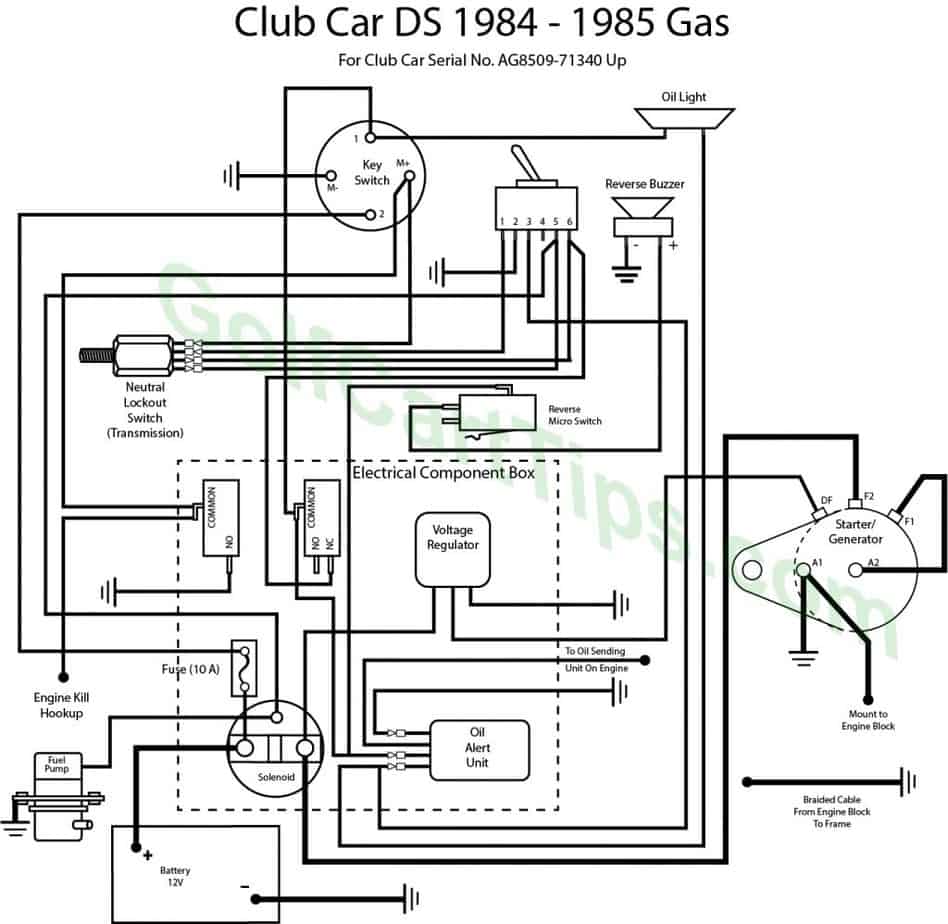
Club Car DS 1986-1990 Gas Model Wiring Diagram
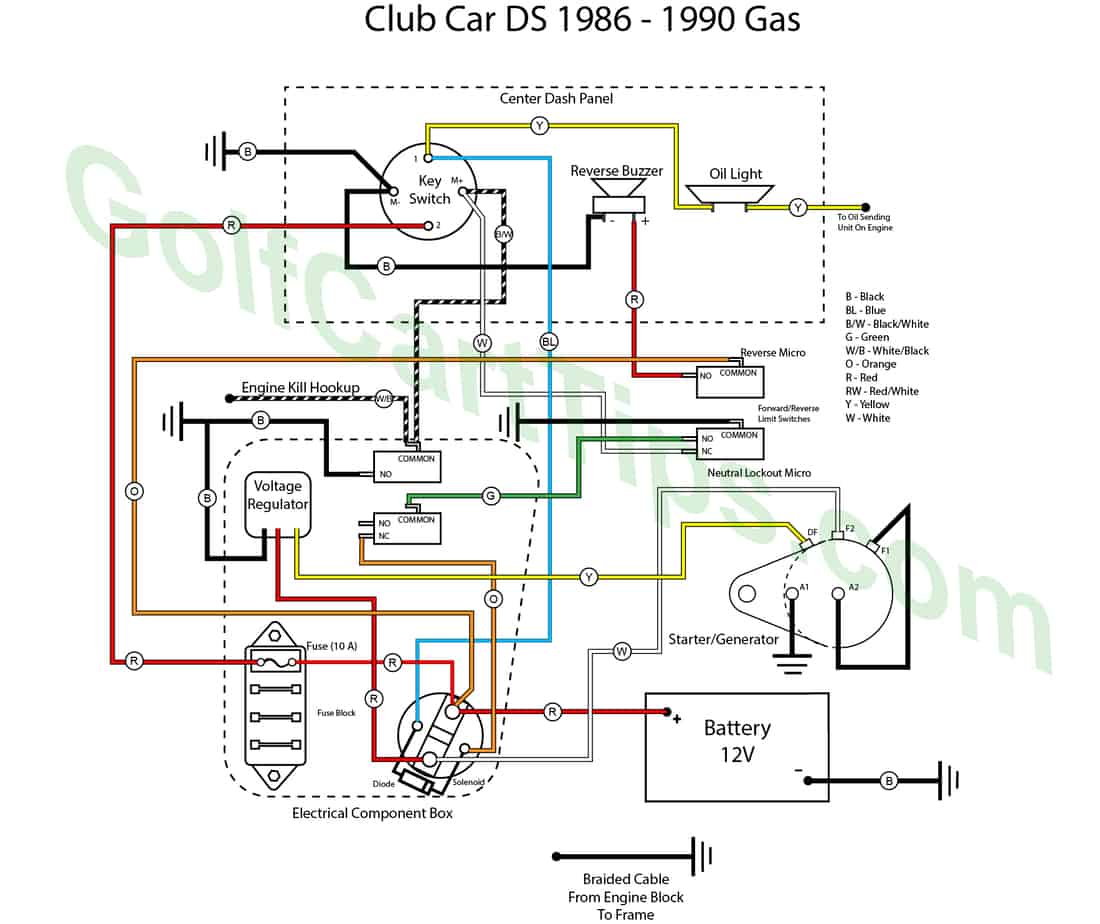
Club Car DS 1991 – 1997 Gas Model Wiring Diagram
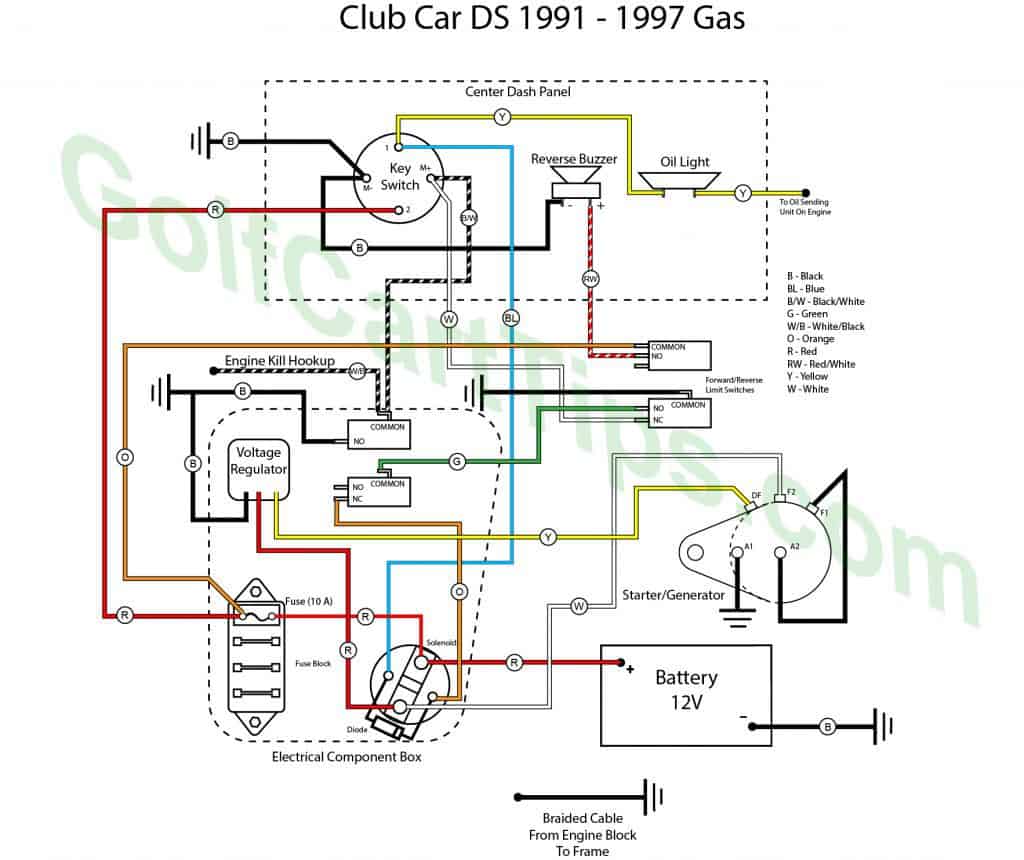
Club Car DS 1998 – 2011 Gas Model Wiring Diagram
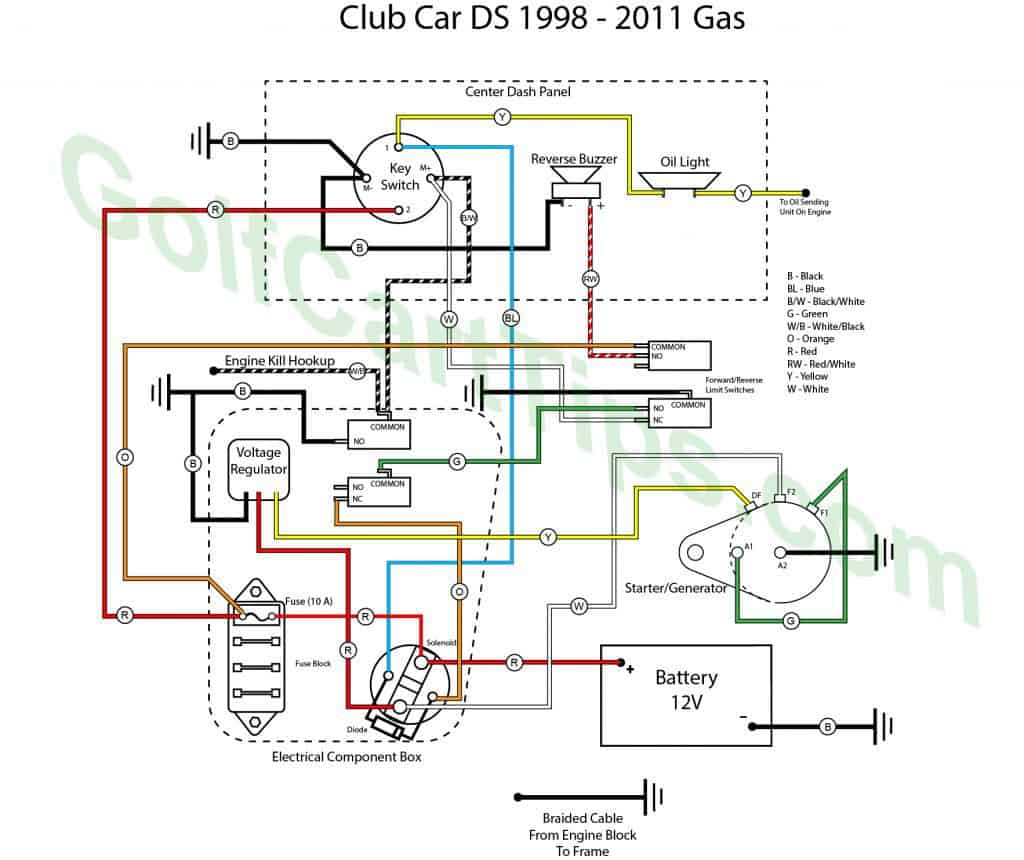
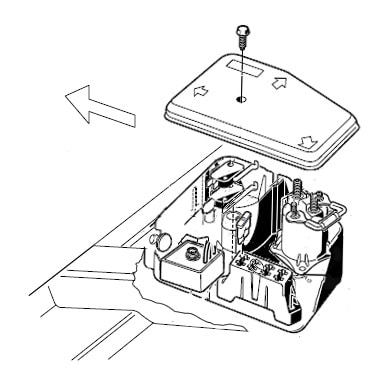
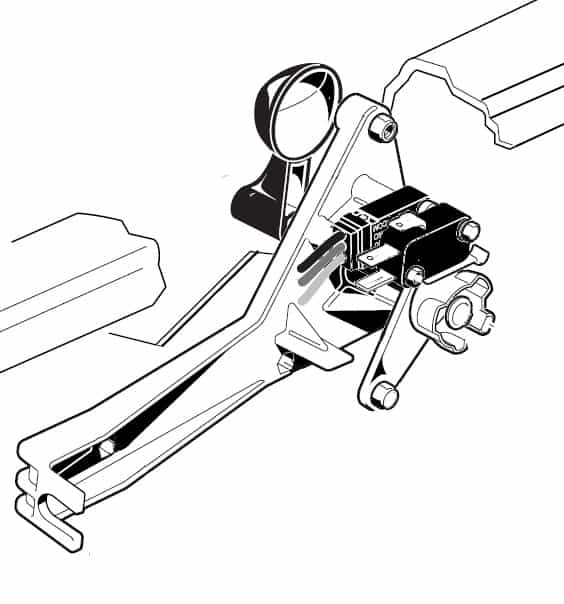
Troubleshooting Guide For Club Car DS Gas Models
| SYMPTOM | POSSIBLE CAUSES |
|---|---|
| ENGINE IS HARD STARTING | 1. Spark plug partially fouled or in poor condition. 2. Spark plug wire damaged. 3. Loose wire connection at the CDI unit. 4. CDI unit failed. 5. Low cylinder compression. 6. Water or dirt in the fuel system and/or carburetor. Dirty or clogged fuel filters. 7. Carburetor improperly adjusted. 8. Starter-generator belt slipping. |
| ENGINE STARTS BUT RUNS IRREGULARLY OR MISSES | 1. Spark plug partially fouled or in poor condition. 2. Spark plug wire damaged. 3. CDI unit failed. 4. Water or dirt in the carburetor. 5. Water or dirt in the fuel system or dirty or clogged fuel filter. 6. Fuel pump malfunction, fuel pressure to engine too low. 7. Carburetor float adjustment incorrect. |
| ENGINE TURNS BUT FAILS TO START | 1. Gasoline tank empty. 2. Gasoline line or filters clogged. 3. Fouled spark plug. 4. Spark plug wire damaged. 5. Loose wire connection at CDI. 6. CDI unit failed. 7. Engine flooded with gasoline as a result of over choking. 8. Kill circuit grounded. 9. Fuel pump malfunction or failure. |
| ENGINE OVERHEATS | 1. Fan screen partially blocked or plugged. 2. Incorrect governor adjustment. |
| ENGINE PRE-IGNITES | 1. Excessive carbon deposit on the piston head, or in the combustion chamber. 2. Spark plug heat range is incorrect for the engine. 3. Unsuitable or contaminated fuel. |
| ENGINE HAS LOSS OF POWER | 1. Exhaust valve restricted with carbon deposit. 2. Muffler or exhaust pipe plugged with carbon or other restriction. 3. CDI unit failed. 4. Air filter dirty or clogged. 5. Governor improperly adjusted. 6. Throttle linkage out of adjustment. 7. Spark plug failed. 8. Restricted fuel flow. 9. Torque converter not backshifting properly. |
| SPARK PLUG FOULS REPEATEDLY | 1. Incorrect plug. 2. Spark plug wire damaged. 3. Unsuitable gasoline or incorrect (rich) fuel mixture. 4. CDI unit failed. 5. Dirt entry. |
| CARBURETOR FLOODS | 1. Inlet valve or seat leaking, dirty, worn, or damaged. 2. Float damaged and filled with gasoline. 3. Incorrect float level setting. |
| STARTER FAILS TO OPERATE | 1. Neutral lock-out cam is in the wrong position. 2. Fuse blown. 3. Battery dead. 4. Starting control circuit not operating. 5. Starter-generator failed. 6. Starter solenoid failed. 7. Accelerator micro switch failed. 8. Key Switch failed. 9. Neutral lock-out micro switch failed. |
| STARTER-GENERATOR DOES NOT CHARGE BATTERY | 1. Loose or broken wire in starter-generator circ1 it. 2. Generator field coil shorted. 3. Brushes worn or commutator dirty. 4. Loose or slipping starter-generator belt. 5. Voltage regulator failed. 6. Battery failed. |
| TRANSMISSION DOES NOT ENGAGE OR DISENGAGE SMOOTHLY | 1. Transmission shifter linkage binding or out of adjustment. 2. Insufficient (low) level of lubricant in transmission or wrong type of lubricant in transmission. 3. Internal gears damaged or worn. 4. Synchronizer rings worn or damaged. |
| ENGINE WON'T QUIT RUNNING | 1. Kill circuit wire is disconnected from CDI. |
Recent Posts
What Does A Golf Cart Speed Controller Do?
The speed controller measures out current and battery voltage to the electric vehicles' motor to raise and lower speed on the golf cart. It monitors the state of the motor and generates signals to...
Source: https://golfcarttips.com/club-car-ds-wiring-diagrams-1981-to-2002/
Posted by: thadtrovere013389.blogspot.com
Posting Komentar